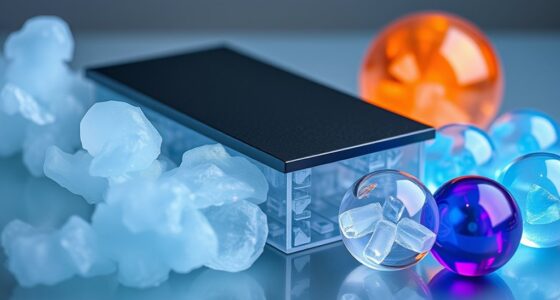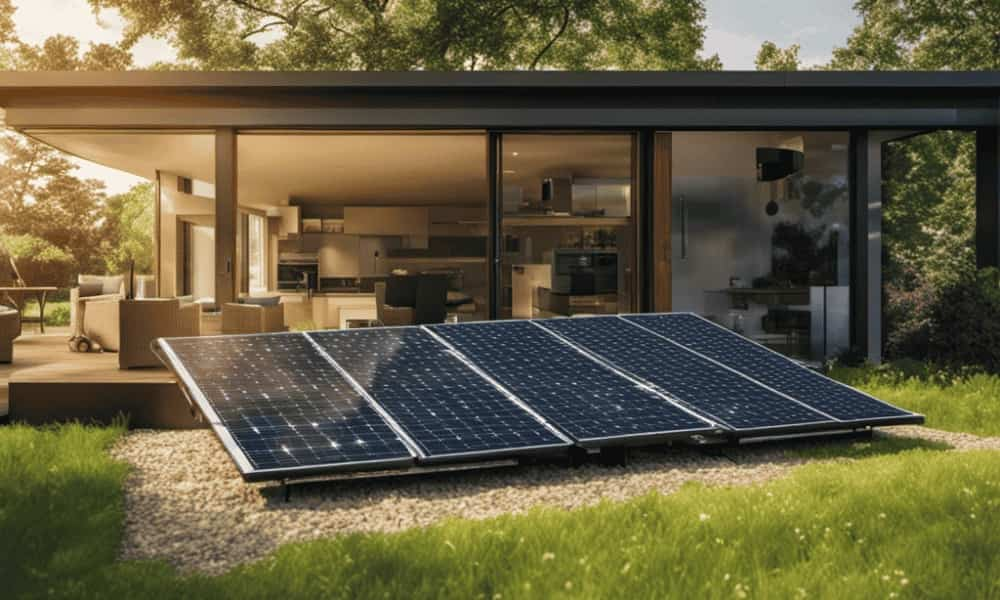We have discovered 11 creative ways to significantly boost the efficiency of your heat pump.
With advanced compressor technology, enhanced heat exchanger design, and intelligent defrost control, we’re revolutionizing the way heat pumps operate.
Variable speed drive systems and thermal energy storage integration are just a couple of the methods we’re utilizing to maximize performance.
By incorporating heat recovery systems, improved insulation materials, and optimal refrigerant selection, we’re taking heat pump efficiency to new heights.

With energy monitoring and management, we’re putting you in control.
Let’s dive into these innovative techniques and start saving energy today.
Key Takeaways
- Variable speed compressors and two-stage compressors improve efficiency by modulating compressor speed and matching capacity to the load.
- Enhanced heat exchanger design optimizes heat transfer and reduces pressure drops, further enhancing heat pump efficiency.
- Intelligent defrost control and variable speed drive systems minimize energy consumption by optimizing the defrosting process and adjusting motor speed based on heating or cooling demands.
- Integrating thermal energy storage improves heat pump efficiency by effectively managing and utilizing stored heat energy.
Advanced Compressor Technology
We have identified three advanced compressor technologies that can significantly improve heat pump efficiency.
The first technology is variable speed compressors, which allow for the modulation of compressor speed based on the heating or cooling demands of the space. This ensures that the heat pump operates at optimal efficiency throughout the day, reducing energy consumption and costs.
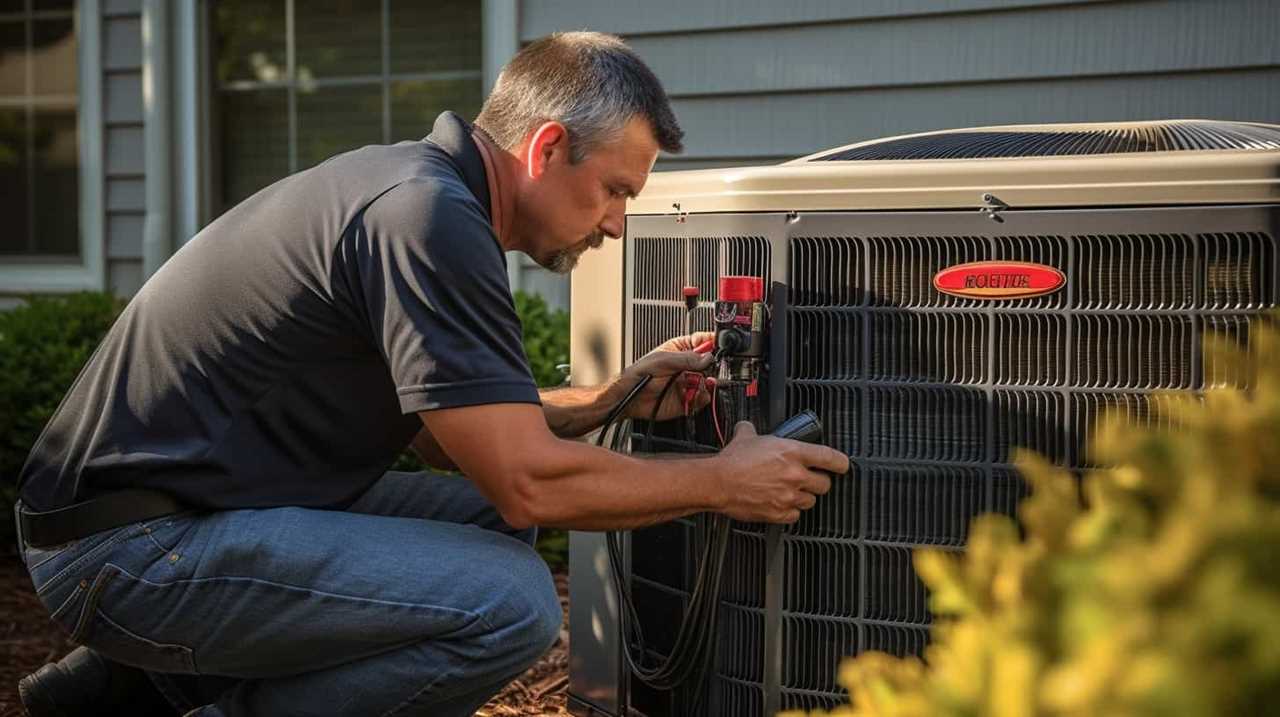
The second technology is two-stage compressors, which have two levels of compression to provide the required heating or cooling capacity. This allows for better matching of the compressor capacity to the load, resulting in improved efficiency.
The third technology is scroll compressors, which offer higher efficiency compared to traditional reciprocating compressors. They operate smoothly and quietly, reducing energy losses and improving overall performance.
These advanced compressor technologies, when combined with enhanced heat exchanger design, can further enhance the efficiency of heat pumps. By optimizing heat transfer and reducing pressure drops, heat exchangers play a crucial role in maximizing the performance of the heat pump system.
Enhanced Heat Exchanger Design
To maximize heat pump efficiency, we can enhance the heat exchanger design by optimizing heat transfer and minimizing pressure drops. By improving the efficiency of heat exchangers, we can ensure that the heat pump operates more effectively, resulting in lower energy consumption and reduced costs.

One way to achieve enhanced heat exchanger efficiency is through the use of advanced heat transfer methods. These methods include the use of enhanced surfaces, such as microchannels or fins, which increase the surface area available for heat transfer. Additionally, techniques like turbulence promotion and flow optimization can further enhance heat transfer rates. By incorporating these advanced heat transfer methods into heat exchanger design, we can significantly improve the overall efficiency of heat pumps.
This enhanced efficiency translates into greater comfort, energy savings, and environmental sustainability.
Transitioning into the subsequent section about ‘intelligent defrost control’, optimizing the heat exchanger design is just one step towards maximizing heat pump performance.
Intelligent Defrost Control
One key technique to improve heat pump efficiency is implementing intelligent defrost control.

Intelligent defrost control is a method that optimizes the defrosting process in heat pumps to ensure efficient operation while minimizing energy consumption.
This technique is particularly useful in geothermal heat pump applications, where the system extracts heat from the ground.
During colder weather, frost can accumulate on the heat exchanger coil, reducing its ability to transfer heat.
Intelligent defrost control monitors various parameters, such as outdoor temperature and coil temperature, to determine when a defrost cycle is necessary.

By analyzing these factors, the system can defrost only when needed, preventing unnecessary energy consumption.
Additionally, intelligent defrost control can adjust the duration and frequency of defrost cycles based on real-time conditions, further maximizing efficiency.
Variable Speed Drive Systems
Variable speed drive systems enhance heat pump efficiency by allowing the motor to adjust its speed based on the heating or cooling demands of the space. This technology, known as variable speed drive technology, offers precise and efficient control over the heat pump’s motor.
By varying the motor speed, the system can match the energy output to the required load, resulting in significant energy savings. Energy efficient motor control is achieved through advanced algorithms and sensors that monitor the ambient temperature and adjust the motor speed accordingly. This ensures that the heat pump operates at its optimum capacity, maximizing efficiency and reducing energy consumption.
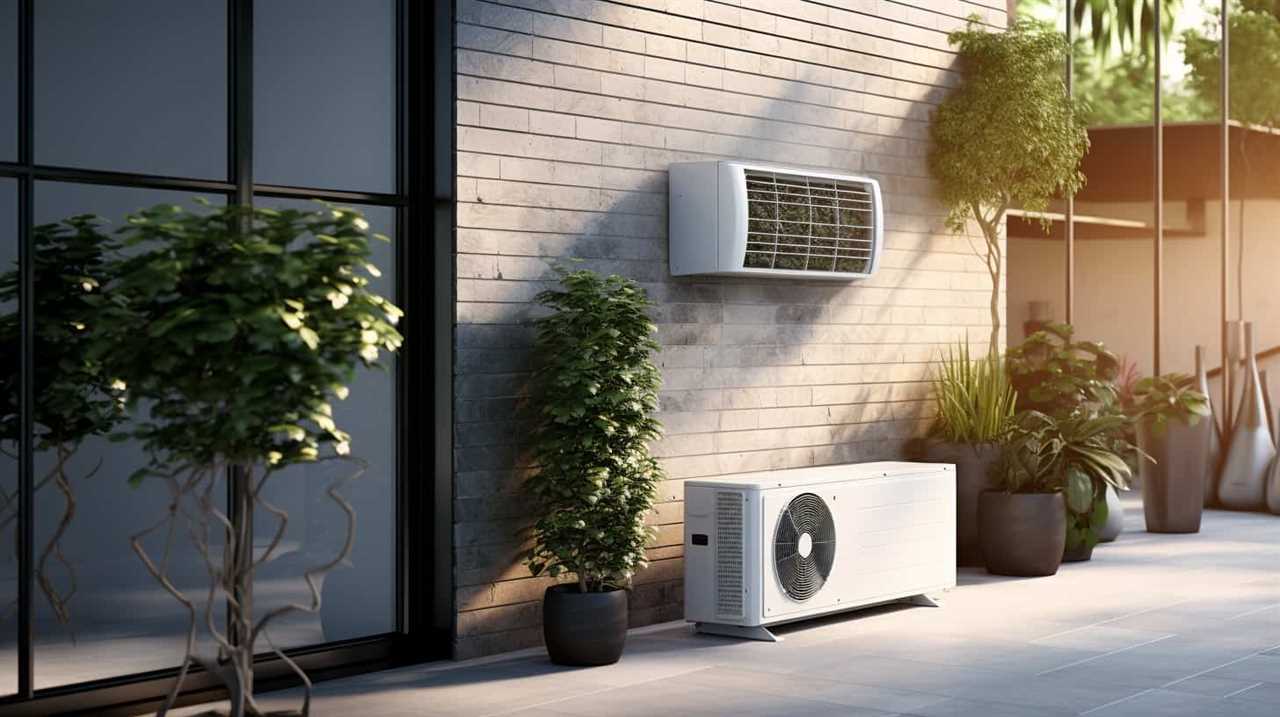
Additionally, variable speed drive systems offer quieter operation and longer equipment lifespan due to reduced wear and tear on the motor.
Thermal Energy Storage Integration
We can improve heat pump efficiency by integrating thermal energy storage through effective management and utilization of stored heat energy.
By incorporating thermal energy storage into heat pump systems, we can achieve several benefits:
-
Increased energy storage efficiency: Thermal energy storage allows us to store excess heat energy during off-peak hours when electricity rates are lower. This stored energy can then be used during peak hours when electricity rates are higher, reducing overall energy costs.

-
Enhanced system flexibility: Integrating thermal energy storage provides greater flexibility in heat pump operation. By storing excess heat energy, we can meet varying heating demands more efficiently, ensuring a constant supply of hot water or space heating without relying solely on the heat pump’s operation.
-
Reduced environmental impact: By utilizing thermal energy storage, we can optimize the heat pump’s operation and reduce the need for auxiliary heating sources. This leads to lower greenhouse gas emissions and a more sustainable heating solution.
Geothermal Heat Pump Applications
Geothermal heat pump applications offer cost-effective energy solutions, environmental benefits, and increased home comfort.
By harnessing the natural heat stored in the earth, these systems can significantly reduce heating and cooling costs.

Additionally, geothermal heat pumps have a smaller carbon footprint compared to traditional heating and cooling systems, making them a more environmentally friendly choice.
Moreover, the consistent temperature provided by geothermal heat pumps ensures optimal comfort inside the home, regardless of the weather conditions outside.
Cost-Effective Energy Solutions
Let’s explore how we can maximize energy efficiency by implementing cost-effective solutions for geothermal heat pump applications.
When it comes to cost-effective installation methods for geothermal heat pumps, there are several options to consider. These include:

-
Vertical Closed-Loop Systems: This method involves drilling deep boreholes to access the Earth’s heat. It’s a highly efficient and reliable option, especially in areas with limited space.
-
Horizontal Closed-Loop Systems: This installation method utilizes horizontal trenches to circulate the heat exchange fluid. It’s a more affordable alternative to vertical systems, making it suitable for larger properties with ample land.
-
Hybrid Systems: Combining geothermal heat pumps with other renewable energy sources, such as solar or wind power, can further enhance energy efficiency. These systems allow for the integration of multiple sustainable energy solutions, reducing reliance on traditional fossil fuels.
Environmental Benefits of Geothermal
By harnessing the Earth’s natural heat and utilizing it for heating and cooling purposes, we can reduce our reliance on non-renewable energy sources and contribute to a cleaner and more sustainable environment. Geothermal technology offers a renewable energy solution that taps into the Earth’s heat to provide efficient heating and cooling systems for residential and commercial buildings. Unlike traditional heating and cooling methods, geothermal heat pump applications produce minimal greenhouse gas emissions and have a significantly lower carbon footprint. The table below highlights some of the key environmental benefits of geothermal technology compared to other energy sources:

| Environmental Benefits | Geothermal Technology | Non-Renewable Energy Sources |
|---|---|---|
| Reduced greenhouse gas emissions | ✓ | ✗ |
| Lower carbon footprint | ✓ | ✗ |
| Less dependence on fossil fuels | ✓ | ✗ |
| Preservation of natural resources | ✓ | ✗ |
| Contribution to a sustainable future | ✓ | ✗ |
Increased Home Comfort
We can enhance the comfort of our homes through the applications of geothermal heat pumps. Geothermal heat pumps provide increased energy savings and personalized temperature control, resulting in a more comfortable living environment.
Here are three key benefits of geothermal heat pump applications:
-
Improved Energy Efficiency: Geothermal heat pumps tap into the stable temperature of the earth to efficiently heat or cool our homes. This reduces the reliance on traditional energy sources and lowers energy costs, leading to increased energy savings.
-
Consistent and Personalized Temperature Control: Geothermal heat pumps provide precise control over indoor temperatures, allowing homeowners to set their preferred levels of comfort. The system can adjust to the specific needs of each room, ensuring a consistent and comfortable environment throughout the house.

-
Reduced Noise and Improved Air Quality: Geothermal heat pumps operate quietly, eliminating the noise associated with traditional heating and cooling systems. Additionally, they don’t rely on fossil fuels, resulting in cleaner and healthier indoor air quality.
Smart Thermostat Optimization
Smart thermostat optimization is an essential aspect of boosting heat pump efficiency.
By implementing energy-saving temperature schedules, homeowners can ensure that their heat pump operates at optimal levels and uses energy efficiently.
Additionally, the remote control capabilities of smart thermostats enable users to adjust settings from anywhere, allowing for better management of energy consumption and ultimately increasing the overall efficiency of the heat pump system.

Energy-Saving Temperature Schedules
Our goal is to optimize temperature schedules in order to save energy and improve heat pump efficiency. By implementing energy-saving temperature schedules, we can achieve cost-effective temperature control and enhance the performance of our HVAC systems.
Here are three key benefits of utilizing such schedules:
-
Reduced energy consumption: By programming temperature adjustments based on occupancy patterns and outdoor weather conditions, energy wastage can be minimized. This leads to lower utility bills and a reduced carbon footprint.
-
Improved comfort: Energy-saving temperature schedules ensure that your home or building is consistently maintained at a comfortable temperature, resulting in increased occupant satisfaction.

-
Extended equipment lifespan: By reducing the workload on your heat pump, energy-efficient temperature schedules can help prolong its lifespan and reduce the need for repairs and replacements.
Remote Control Capabilities
By utilizing remote control capabilities and integrating smart thermostat optimization, we can effectively enhance the efficiency of our heat pump systems.
Remote control integration allows us to conveniently control our heat pump settings from anywhere, ensuring that our systems are always operating at optimal levels.
Through energy efficient programming, we can schedule temperature adjustments based on our daily routines and preferences, further maximizing energy savings.

With the ability to remotely monitor and adjust our heat pump systems, we can easily make real-time changes to optimize performance and reduce energy waste.
Additionally, smart thermostat optimization enables us to analyze energy usage patterns and make informed decisions to improve efficiency.
Heat Recovery Systems
We can improve the efficiency of heat pumps by implementing heat recovery systems. Heat recovery systems enable the transfer and reuse of waste heat generated by the heat pump for other purposes, such as water heating or space heating.
Here are three key benefits of heat recovery systems:

-
Energy savings: By utilizing waste heat, heat recovery systems reduce the overall energy consumption of the heat pump. This results in lower energy bills and a more sustainable operation.
-
Increased comfort: Heat recovery systems can provide additional heat to other areas of the building, improving overall comfort levels. This is especially beneficial in larger buildings with multiple zones.
-
Environmental impact: By maximizing the use of waste heat, heat recovery systems reduce the need for additional energy sources, resulting in lower greenhouse gas emissions and a reduced carbon footprint.
Improved Insulation Materials
When it comes to improving heat pump efficiency, one important aspect to consider is the use of improved insulation materials. Thicker insulation layers can significantly reduce heat loss and improve overall energy efficiency.

Additionally, advancements in insulating materials, such as aerogels and vacuum panels, offer even better thermal resistance and insulation properties.
Thicker Insulation Layers
The use of thicker insulation layers with improved insulation materials can significantly enhance the efficiency of heat pumps. Thicker insulation layers provide better thermal resistance, reducing heat transfer between the indoor and outdoor environments. This helps maintain a consistent temperature inside the building, reducing the workload on the heat pump and improving energy efficiency.
Here are three reasons why thicker insulation layers are beneficial:
-
Reduced heat loss: Thicker insulation layers minimize heat loss through walls, ceilings, and floors, ensuring that the heat generated by the heat pump stays inside the building. This results in less energy wastage and lower heating costs.
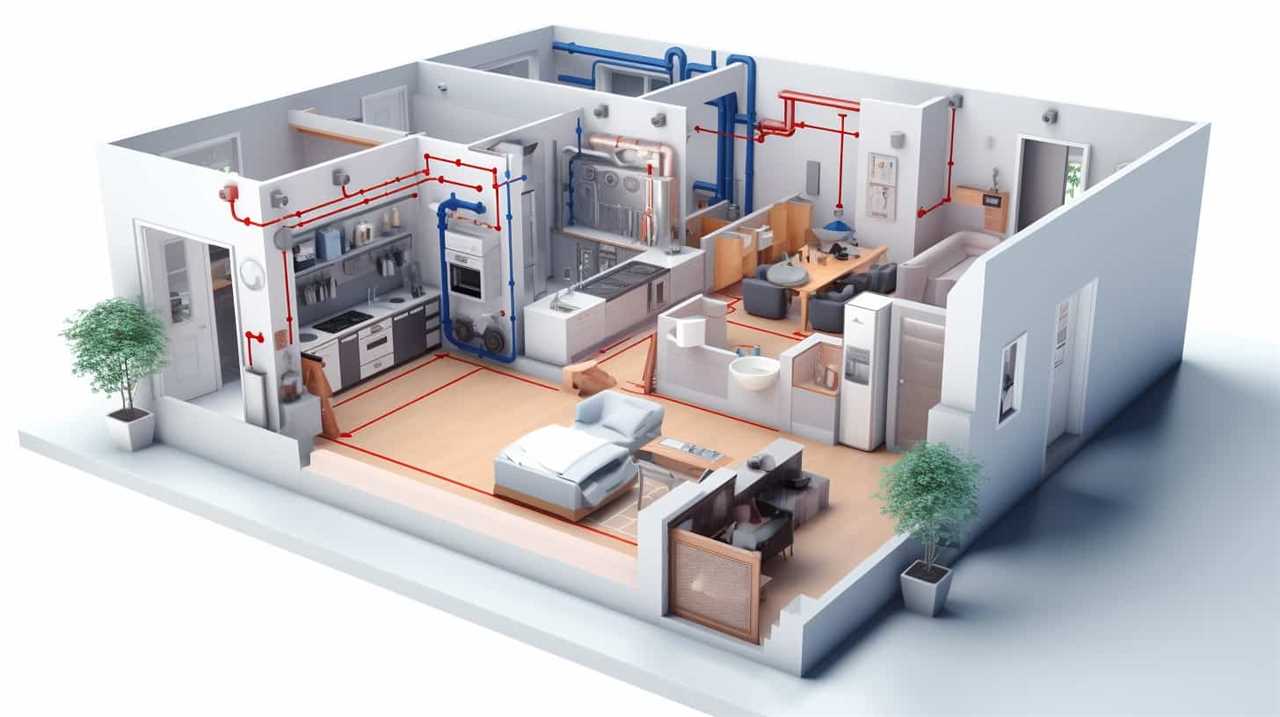
-
Improved comfort: Thicker insulation layers create a barrier against cold drafts and external temperature fluctuations. This enhances indoor comfort by maintaining a stable and comfortable temperature throughout the year.
-
Environmental impact: Thicker insulation layers can reduce the carbon footprint of a building by lowering energy consumption. By improving heat pump efficiency, less energy is required to achieve the desired indoor temperature, resulting in fewer greenhouse gas emissions.
Advanced Insulating Materials
Using advanced insulating materials can improve heat pump efficiency. These materials, such as aerogels and vacuum insulation panels (VIPs), employ advanced insulation technologies and thermal conductivity reduction techniques to enhance the performance of heat pumps.
To illustrate the benefits of advanced insulating materials, consider the following table:
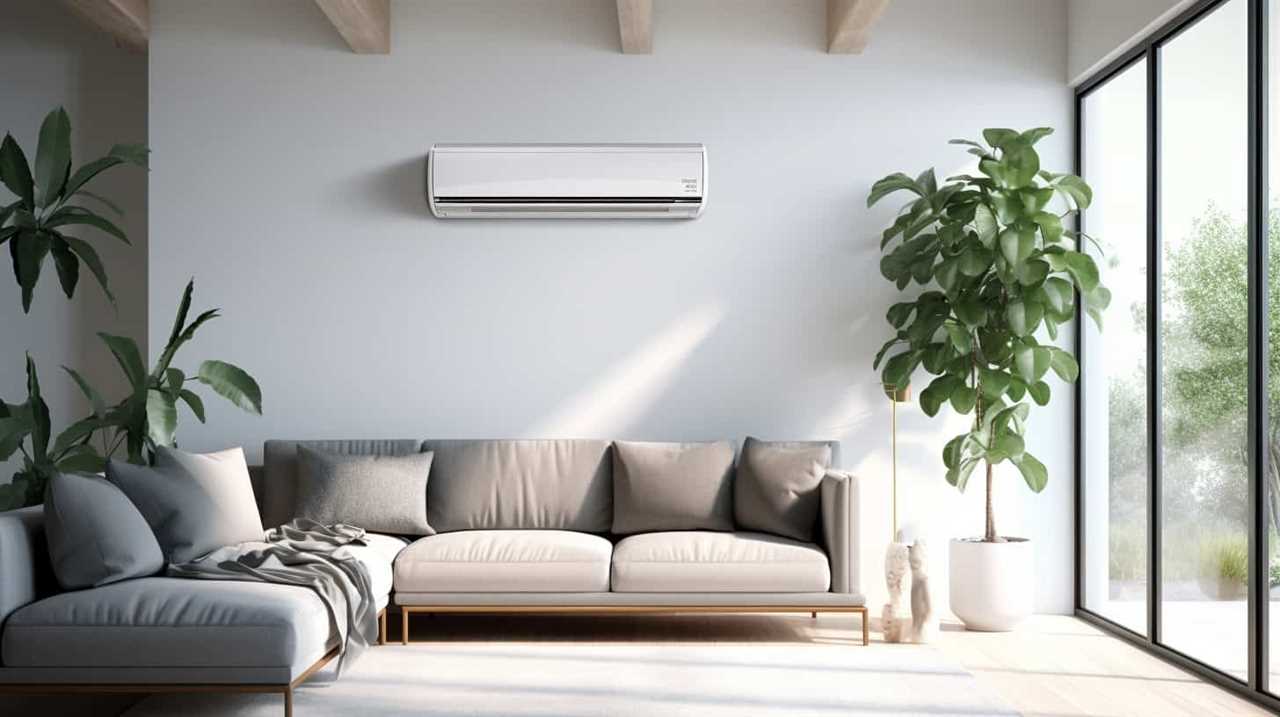
| Insulation Material | Thermal Conductivity (W/mK) | Thickness (mm) | R-value (m²K/W) |
|---|---|---|---|
| Standard Fiberglass | 0.040 | 100 | 2.5 |
| Aerogel | 0.013 | 20 | 7.7 |
| VIP | 0.004 | 10 | 25 |
| Advanced Foam | 0.020 | 50 | 5.0 |
As shown in the table, advanced insulating materials have significantly lower thermal conductivity compared to standard fiberglass insulation. This lower thermal conductivity leads to thinner insulation layers, resulting in improved heat pump efficiency. By incorporating these advanced insulation technologies, heat pumps can achieve higher energy efficiency ratings and reduce energy consumption, benefiting both the environment and the users.
Insulation for Optimal Performance
For optimal performance, we can enhance heat pump efficiency by using improved insulation materials. Insulation plays a crucial role in reducing heat transfer and ensuring that the heat pump operates at its maximum efficiency.
Here are three types of insulation materials and installation techniques that can significantly improve the performance of heat pumps:
-
Spray Foam Insulation: This type of insulation is applied as a liquid and expands to fill gaps and crevices, providing an airtight seal. It offers excellent thermal resistance and minimizes heat loss, resulting in improved energy efficiency.

-
Reflective Insulation: This type of insulation consists of a reflective surface that reflects radiant heat away from the heat pump. By reducing heat absorption, it helps maintain a consistent temperature and enhances overall efficiency.
-
Insulation Installation Techniques: Proper installation techniques, such as sealing all joints and gaps, using vapor barriers, and ensuring adequate insulation thickness, are essential for optimal performance. These techniques prevent air leakage, moisture buildup, and thermal bridging, resulting in improved heat pump efficiency.
Optimal Refrigerant Selection
We should consider the environmental impact when selecting the most suitable refrigerant for optimal heat pump efficiency. Refrigerant efficiency plays a crucial role in determining the overall performance of a heat pump system. By choosing the right refrigerant, we can minimize energy consumption and reduce greenhouse gas emissions.
To achieve this, refrigerant selection optimization is necessary. It involves evaluating various factors such as thermodynamic properties, environmental impact, and safety considerations. For instance, selecting a refrigerant with a low global warming potential (GWP) can significantly contribute to reducing carbon emissions. Additionally, the refrigerant’s heat transfer properties and compatibility with the heat pump system should be carefully analyzed.

By optimizing refrigerant selection, we can enhance heat pump efficiency while ensuring minimal environmental impact.
This leads us to the next section, where we’ll discuss the importance of energy monitoring and management.
Energy Monitoring and Management
Our team utilizes advanced energy monitoring and management techniques to maximize heat pump efficiency and optimize energy consumption. By conducting thorough energy consumption analysis, we’re able to identify areas of improvement and implement strategies to reduce energy waste. Our load balancing strategies ensure that the heat pump operates at its optimal capacity, avoiding unnecessary energy consumption.
-
Real-time monitoring: We employ cutting-edge technology to continuously monitor the energy consumption of the heat pump. This allows us to identify any anomalies or inefficiencies promptly and take appropriate action.

-
Data-driven decision-making: Our energy monitoring system generates detailed reports and data analysis, enabling us to make informed decisions about energy usage. This allows us to optimize the heat pump’s performance and minimize energy waste.
-
Smart energy management: With our advanced energy management techniques, we can automate and optimize the heat pump’s operation based on factors such as weather conditions and occupancy patterns. This ensures that energy is used efficiently, avoiding unnecessary consumption and reducing costs.
Frequently Asked Questions
How Does Advanced Compressor Technology Contribute to Boosting Heat Pump Efficiency?
Advanced compressor technology significantly boosts heat pump efficiency. By incorporating innovative strategies and advancements, we improve the overall performance and energy efficiency of heat pumps, leading to reduced energy consumption and cost savings for consumers.
What Are Some Key Features of Enhanced Heat Exchanger Design That Enhance Heat Pump Efficiency?
Enhanced heat exchanger design incorporates features such as heat transfer enhancement and refrigerant flow optimization. These techniques improve heat pump efficiency by increasing the rate of heat transfer and optimizing the flow of refrigerant, resulting in enhanced performance.

How Does Intelligent Defrost Control Improve the Efficiency of Heat Pumps?
Intelligent defrost control techniques play a crucial role in optimizing heat pump efficiency. By accurately sensing frost buildup and strategically timing defrost cycles, we can prevent energy waste and ensure optimal performance.
Can You Explain the Benefits of Using Variable Speed Drive Systems in Heat Pump Applications?
Variable speed drive systems in heat pump applications offer significant benefits. By adjusting the speed of the compressor and fan motors to match the load, these systems provide precise control, resulting in improved energy efficiency and substantial energy savings.
How Does Thermal Energy Storage Integration Help to Optimize the Efficiency of Heat Pumps?
Thermal energy storage integration optimizes heat pump efficiency by allowing excess energy to be stored for later use. Smart grid connectivity enables the heat pump to communicate with the grid, ensuring energy is used efficiently.
Conclusion
In conclusion, by implementing these 11 innovative techniques, heat pump efficiency can be significantly boosted.

Advanced compressor technology, enhanced heat exchanger design, and intelligent defrost control are just a few examples of the advancements that can revolutionize the performance of heat pump systems.
With variable speed drive systems, thermal energy storage integration, and improved insulation materials, the potential for energy savings becomes even greater.
By selecting optimal refrigerants and implementing energy monitoring and management systems, the future of heat pump efficiency looks promising.
Stay tuned for more exciting advancements in this field!




